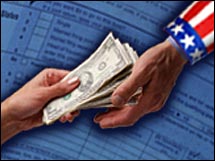Year-end tax tips for small bizThe last minute moves that every small business owner should make before the end of the year to ease their tax burden.NEW YORK (CNNMoney.com) -- Aside from buying gifts, attending parties and making travel arrangements it's also the season to be tax planning. The following advice, culled from a few small business tax experts, will help make your tax burden less like coal and more like candy - just as long as you get your accounts in gear before New Year's Eve.
To that end, here are five tips to get you in the spirit: 1. Contribute to a retirement plan: If you haven't already done so, now is the time to set up a retirement plan. Payments to your retirement plan will reduce your income for this year and translate into "significant dollar deductions," according to Mark Lufcombe, principal analyst at CCH, a tax and business law information provider. But keep in mind, different types of plans (e.g., Keogh, Simple, SEP) have different contribution limits and different deadlines. Be sure to consult your financial planner or accountant to find the best strategy for your business. Hugh Bromma, CEO of The Entrust Group, an administration services provider for small businesses, suggests setting up a ROTH 401(k) before Dec. 31. "Because of tax law changes (sole proprietors, S-corporations or C-corporations) can make deferrals to their 401(k) on a ROTH-like basis," he said, and "they won't have to pay tax on that income again." Above all else, maximizing savings is the most important thing, Bromma said. Not only will you reap the tax benefits but it's a good idea to "take this opportunity to save as much as possible." 2. Defer income: Any payments your business can receive during the first week of January instead of in December cuts your tax bill. Income that is deferred to January 2007 will not be taxable until April 2008. Of course, any deferral strategy will depend on your profit and losses for the year and your company's legal structure. Keep in mind that this works only if the business's method of accounting is on a cash basis. Again, consult your tax advisor and figure out what your limitations are, based on whether you are a sole proprietor, partnership or S-corporation. 3. Increase expenses: Purchasing items that your business will require in the immediate future will maximize deductions for this year. Consider stocking up on office supplies or equipment now, if cash flow permits. Section 179 of the Internal Revenue Code allows small business to expense acquisitions up to $108,000 in 2006. Just keep in mind that if you will be buying new office equipment, you may need to factor in depreciation. In addition, you will have to use the equipment in your office by year-end. 4. Pay bills now, not later: Pay any outstanding bills such as utilities, rent, insurance and healthcare before Dec. 31 to take the deduction this year and lower your tax bill some more. That also goes for year-end bonuses to employees, which can be paid just prior to Dec. 31 to get the deduction in the current year. And while on the subject of bills, there is a new provision for 2006 that allows for a refund of the telephone excise tax. Any business with a phone is eligible and the IRS has developed a formula to simplify the calculations for the refund amount. 5. What to watch out for: Lufcombe warns against using any strategy to reduce your taxes that does not have a valid business purpose. "It might be subject to challenge for not having economic substance," he said Sheltering income, offshore or otherwise, is not as easy as it sounds, warns Bromma. "A lot of people think they can shelter income by going offshore but the IRS is cracking down," he said. Basically, Bromma adds, "don't do anything that is a gray area." |
Sponsors
|

